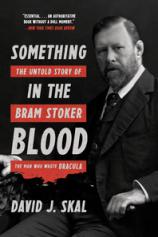Something in the Blood: The Untold Story of Bram Stoker, the Man Who Wrote Dracula
Review
Something in the Blood: The Untold Story of Bram Stoker, the Man Who Wrote Dracula
In SOMETHING IN THE BLOOD, author David Skal ambitiously endeavors to tell the life story of Bram Stoker --- the turn-of-the-20th-century Irish author best remembered for his creation of the world’s archetypal vampire in DRACULA (1897) --- in a work that is in theory a biography but in truth defies genre definition. The unorthodox form Skal uses to chronicle Stoker’s life is implemented out of necessity: so little verifiable information about the author exists today that Skal has to fill in expansive blanks using a mixture of applicable European history lessons, analysis of literature and theatrical works of the time, biographies of literary fellow travelers whose lives crossed paths with Stoker’s, and, quite prominently, well-informed inferences that form a compelling argument about what must have motivated the enigmatic author in his day.
Abraham Stoker, Bram for short, grew up a very sickly and bedridden child in Ireland whose only sources of enjoyment were the patently wild folk tales of Ireland and the fantastical musical comedy plays of the time, known as pantomimes. Surprisingly, he developed into a tall, robust young man who was much better known at Trinity College in Dublin for his athletic prowess on the rugby pitch and in foot races than for his academics. Despite his good looks and popularity, Stoker felt like an outsider because his ambiguous sexuality did not fit within the rigid heterosexual norms of the Victorian world. His passion for literature was drastically intensified in college when he discovered the poetry of Walt Whitman and found a kindred spirit in the American bard, whose LEAVES OF GRASS described a form of affection between men that never previously had been articulated for Stoker.
"SOMETHING IN THE BLOOD successfully brings Dracula to life by shining a light on the equally secretive, inscrutable author who created him."
The majority of Stoker’s adulthood was dominated by his adoration of and near-enslavement to the legendary Shakespearean actor Henry Irving. His selfless devotion to his job as Irving’s aide-de-camp was ruinous to his family life and left him almost no time for other pursuits, so it took him seven agonizing years to complete DRACULA. It is no coincidence that his debonair, blood-sucking protagonist bears a noticeable resemblance to Irving.
Much of SOMETHING IN THE BLOOD’s appeal comes from how neatly the many disparate elements of Skal’s work come together, creating a mosaic that ultimately adds up to an honest, telling portrayal of the mysterious Stoker. Skal goes on tangents in which Stoker’s name may not come up for 10 pages at a time as he tells vivid stories about contemporaries like Oscar Wilde, whose own persecution for homosexual behavior aptly sums up the intolerance of Stoker’s time. These snapshots of Wilde and many others come together to give readers an important understanding of the literary, political and social world that Stoker lived in and was shaped by.
Since so little is known about Stoker, Skal is forced to make educated guesses about the internal life of the author. At times, he uses literally Freudian approaches to psychoanalyze Stoker to determine his motivations and desires, which is risky. SOMETHING IN THE BLOOD is filled with interpretive statements, such as: “Since he was a self-punishing person all his life, it would not be surprising that masochistic surrender might be a prominent aspect of his sexual imagination.” Freudian psychology has fallen out of favor as a pseudo-science at best, but Skal’s use of the technique is fitting because Freud is the byproduct of the same late-19th century, post-Darwin obsession with the animal tendencies of humans that gave rise to Dracula himself, who shapeshifts from human to animal form regularly. There is no way to know exactly what Stoker felt or believed, so speculation is inevitable in telling his story.
The reason SOMETHING IN THE BLOOD is effective is because Skal is such an expert on the subject that there is no one better to make these unavoidable assumptions. His research for the book seems to have been as exhausting as it is exhaustive. He clearly went to nearly every location described here in person and has immersed himself in Stoker’s life and work as much as any researcher possibly could. SOMETHING IN THE BLOOD successfully brings Dracula to life by shining a light on the equally secretive, inscrutable author who created him.
Reviewed by Rob Bentlyewski on October 21, 2016
Something in the Blood: The Untold Story of Bram Stoker, the Man Who Wrote Dracula
- Publication Date: October 31, 2017
- Genres: Biography, History, Nonfiction
- Paperback: 672 pages
- Publisher: Liveright
- ISBN-10: 1631493868
- ISBN-13: 9781631493867





